The Motorcycle Helmet Market is estimated to be valued at USD 3.1 billion in 2025 and is projected to reach USD 6.2 billion by 2035, registering a compound annual growth rate (CAGR) of 7.1% over the forecast period.
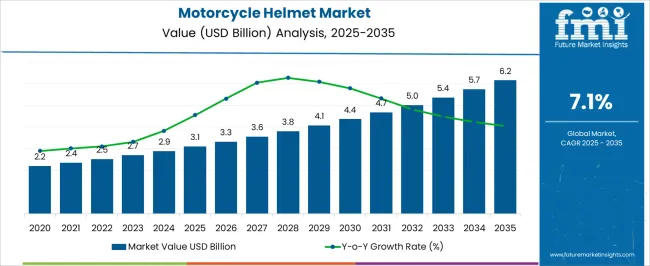
| Metric | Value |
|---|---|
| Motorcycle Helmet Market Estimated Value in (2025 E) | USD 3.1 billion |
| Motorcycle Helmet Market Forecast Value in (2035 F) | USD 6.2 billion |
| Forecast CAGR (2025 to 2035) | 7.1% |
The motorcycle helmet market is experiencing sustained growth as global road safety regulations tighten and awareness of head injury prevention increases among riders. Governments across developed and emerging economies are implementing stricter safety mandates and mandatory helmet laws, driving helmet adoption in both urban and rural areas.
Technological advancements in impact absorption, ventilation systems, and noise reduction have enhanced user comfort and safety, influencing consumer preference for higher quality helmets. Additionally, the growing popularity of premium motorcycles and the rise in two wheeler commuting due to urban congestion have led to increased demand for reliable and stylish protective gear.
The market outlook remains positive as innovation in lightweight materials, smart helmet integration, and aesthetic customization continues to align with consumer lifestyle trends and safety expectations.
The market is segmented by Product and End-user and region. By Product, the market is divided into Full Face, Open Face, Off-Road/ Racing, and Others. In terms of End-user, the market is classified into Rider, Passenger, Distribution Channel, Offline, and Online. Regionally, the market is classified into North America, Latin America, Western Europe, Eastern Europe, Balkan & Baltic Countries, Russia & Belarus, Central Asia, East Asia, South Asia & Pacific, and the Middle East & Africa.
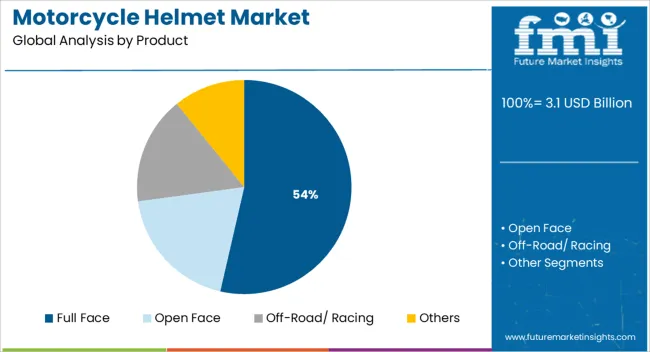
The full face helmet segment is expected to account for 53.60% of total market revenue by 2025 within the product category, establishing it as the leading segment. This dominance is supported by its comprehensive head and face coverage, which provides superior protection during high speed collisions and road mishaps.
The design also offers enhanced aerodynamic efficiency and noise isolation, making it preferred for both daily commuting and long distance travel. Full face helmets are increasingly being selected by performance conscious and safety aware consumers due to their ability to minimize facial trauma and shield against harsh weather conditions.
Improvements in material engineering and ergonomic design have further contributed to the segment's appeal, reinforcing its position as the most reliable and protective option in the helmet category.
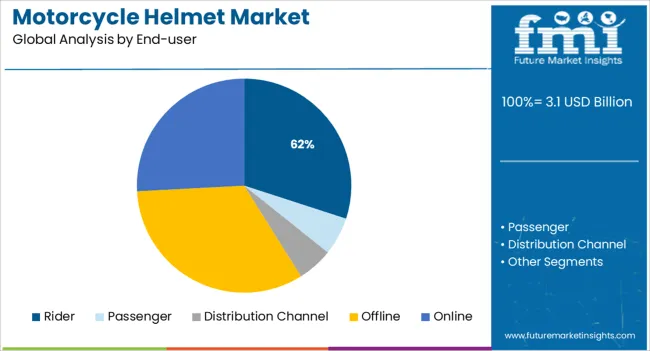
The rider segment is projected to represent 62.10% of the total market share by 2025 within the end use category, highlighting its dominant role in market growth. This trend is driven by the fact that the rider is directly exposed to impact risks and is legally mandated to wear a helmet in most regions.
Increasing sales of motorcycles for personal transportation, coupled with rising concerns about road safety, are encouraging individuals to invest in high quality protective gear. The rise in recreational motorcycling and professional sports events has also contributed to greater awareness of head safety among riders.
Manufacturers are prioritizing comfort, lightweight construction, and design innovation to cater to rider specific needs. The consistent emphasis on individual safety compliance and increasing rider population have ensured that this segment continues to lead.
With a market share of approximately 60.1%, Full-face helmets were the largest product segment. It is estimated to maintain its dominance throughout the forecast period. Manufacturers are adopting superior materials including carbon fiber and fiberglass-reinforced plastic to lessen the weight of full-face products as well as to make them safer. In addition, vendors are incorporating advanced communication tools such as Bluetooth in helmets, which in turn is likely to open new business opportunities during the forecast period.
Major manufacturers such as HJC Europe S.A.R.L, Studds Accessories Ltd., Dainese SpA, Shoei Co. Ltd, Arai Helmet Ltd. Etc., are launching new products to cater to the rising product demand. Recently in March 2024, Studds Accessories Ltd., one of the major two-wheeler helmet manufacturers introduced the Studds D5 Decor full-face helmet, with features including UV-resistant paint, hypoallergenic liner, regulated density EPS, and a quick-release chin strap.
The rider segment held the largest revenue share in the global motorcycle helmet market in 2024, capturing more than 89%. According to the survey held by National Occupant Protection Use, the use of Department of Transportation-compliant helmets was around 64.0% in 2024.
Although motorcycle helmet use has increased by more than 12.0% since 2002, and decreased to 8.6% since 2020. Recent estimates by the same source show that the use of helmets has decreased to 64.9% in 2024 from 69.0% in 2024.
Online channels are expected to expand at the fastest CAGR of 8.1% from 2025 to 2035 due to ease of shopping and convenient product delivery. Moreover, online retailers such as Amazon and HELMEXPRESS.COM among others are concentrating on this product category to capitalize on the rising product demand. In addition, e-commerce platforms, social media, and Google Ads play an essential role in influencing consumer preference.
The availability of high-speed internet and smartphones in developing countries such as India, China, Indonesia, and Vietnam is anticipated to promote utilization of the online platforms for purchasing motorcycle helmets. The companies are launching their exclusive websites where consumers can buy genuine products directly from the source.
Over the past few years, there has been an increase in the demand for motorcycle helmets. This is due to rising sales of motorbikes and ATVs and the rising number of motorbikes and sports two-wheeler enthusiasts. The motorcycle helmet market was growing at a CAGR of 4.1% from 2020 to 2025, whereas it is growing at an impressive CAGR of 7.1% during the forecast period of 2025 to 2035. This market is expected to be valued at USD 5.3 Billion by the end of the forecast period.
Growing global demand for luxury motorcycles and the growing popularity of motorcycle events and championships are the key factors anticipated to create good growth opportunities for the motorcycle helmet market. In addition, the worldwide popularity of motorsports and racing championships at national and international levels is rapidly increasing which is propelling the growth of this market.
Rising Number of Motorbikes and Sports Two-wheeler Enthusiasts to propel Market Growth
In established countries, two-wheelers are mainly used for recreational happenings and therefore more often owned in addition to a car. Moreover, in developing nations, a motorcycle is generally used as a basic medium of transport. Bikes are reaching a stronghold in the commercial sector as well. They are primarily used for food delivery and delivery of e-commerce products. Also, post-lockdown, the demand for bikes has increased significantly due to the bike-sharing business attaining pace. This pooled with the growing consciousness of on-road protection is anticipated to propel the market growth during the forecast period.
The rising global demand for luxury motorcycles and the growing popularity of motorcycle events and championships are the key factors anticipated to create good growth opportunities for helmet manufacturers. In addition, the worldwide popularity of motorsports and racing championships at national and international levels is rising rapidly. Leading automakers such as Honda, Ducati, Suzuki, Yamaha, and Repsol Honda play a critical role in the success through dealer promotions, advertising, and providing financial and technical support to teams, riders, and track operators
Heavyweight lack of comfort and high prices of advanced helmets can hinder the market growth
Despite the life-saving features, some motorcyclist does not prefer riding with a helmet. According to research published by the National Center for Biotechnology Information, the most common reasons for not using a helmet are neck pain, limited head mobility, suffocation, and discomfort due to the heavy weight of the helmet. Additionally, advanced, and premium motorcycle helmets have a limited customer base owing to the high cost of the product and partnerships with premium bike users. Hence, all such factors are likely to hamper the growth of the helmet market during the forecast period
The rising prevalence of fake copies of helmets continues to restrict market growth. Counterfeit/fake helmets are those helmets that are maliciously sold and marketed at a relatively less price. According to the World Health Organization report, close to 360,000 fatalities and 1.5 million injuries can be linked to defective and low-quality vehicle parts and gears, every year.
These helmets may not be able of providing appropriate comfort and protection to the wearers, as these products are usually manufactured using cheap-quality materials. The presence of counterfeit products also influences the consumer’s perception of the brand. The circulation of counterfeit helmets is more prevalent in Asian markets, particularly in China, Pakistan, and India.
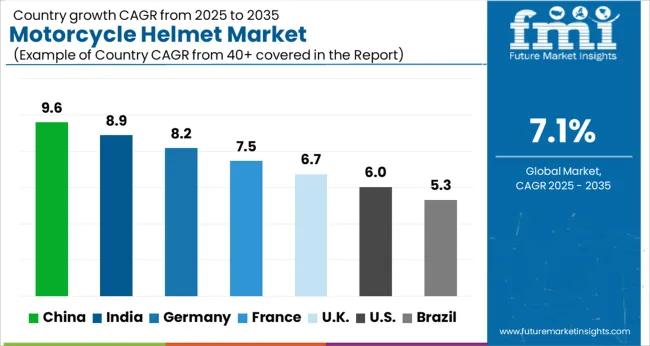
Factors such as an increase in the demand for motorcycles and all-terrain vehicles (ATVs), combined with the rise in disposable income of individuals, have had a positive influence on the North America Biker Helmet market growth in recent years. Furthermore, the rising middle-class income group, especially in several fast-growing states, has positively influenced the market growth, in turn, offering various lucrative business opportunities for the market players in the region.
Presently, the companies operating in the helmet market offer product such as half-face, full-face, off-road, and open-face styles of helmets. Moreover, the incorporation of Bluetooth in helmets has allowed bikers to connect earphones, microphones, and cameras for vlogging and effective communication. Thus, the helmet market is poised to offer various profitable business opportunities for market players during the coming years. However, the robust competition from four-wheel vehicles and increasing financing options remain valuable alternatives to a lot of bikers operating in the region. The motorcycle helmet market of North America was valued at USD 3.10 Million in 2025 and is projected to reach USD 6.2 Million by 2035; it is expected to grow at a CAGR of 6.09% from 2025 to 2035.
Asia Pacific held the largest market share of more than 67.2% in 2025 and will account for a market value of USD 6.11 Billion during the forecast period owing to the strong buyer foothold of the two-wheeler market in countries such as India, China, Indonesia, and Vietnam. Major manufacturers including, DaineseSpA, HJC Europe S.A.R.L, Shoei Co. Ltd, Arai Helmet Ltd, and Schuberth GmbH are launching new products to gain maximum customer penetration in the region.
This region is expected to witness a proliferation in the coming years. An increase in the sales of motorcycles in the region, and the end-users preference and awareness toward enhanced safety and comfort offered by premium helmets are some of the factors fueling the growth of the market. Asia-Pacific is projected to become the fastest-growing and most emerging region for motorcycle helmets in the forthcoming years. Strict government rules and regulations of safety rides and developing economies is the key growth factor in this region.
India is the fastest-growing market for motorcycle helmets in the Asia Pacific due to a large number of two-wheeler buyers in the country. The growth of the helmet industry is not only dominated by commuter motorcycles but even by the larger and more premium two-wheelers. Further, the development of infrastructure in rural areas is also boosting the sales of two-wheelers, and in turn, is expected to boost demand for helmets.
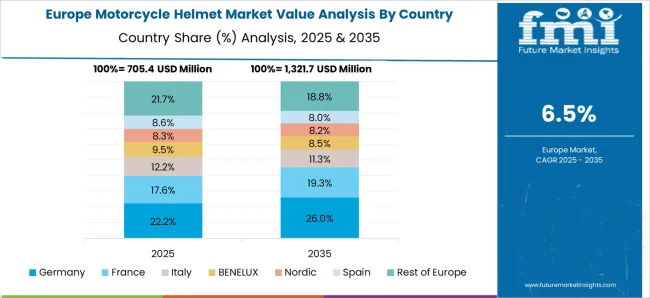
Europe is anticipated to register the highest growth rate during the forecast period. In the global market, Europe is anticipated to witness the highest CAGR of 7.8% from 2025 to 2035. Motorcycle registrations in this region grew by more than 7.0% in 2024, totaling 949,470 unit registrations.
Europe Helmet Market is expected to register sound revenues in the upcoming years underpinned by a rising number of cyclists across the region. Moreover, the growing transportation sector in the entire region is expected to gain traction underpinned by increased e-commerce and retail stores that have boosted online deliveries hence the purchase of two-wheelers is one of the factors expected to instigate the deployment of the helmets as a result it is anticipated to augment the growth of the Europe helmet market in the upcoming years.
The growing interest in technologically advanced products has motivated many start-ups to venture into the motorcycle helmet domain to offer innovative products.
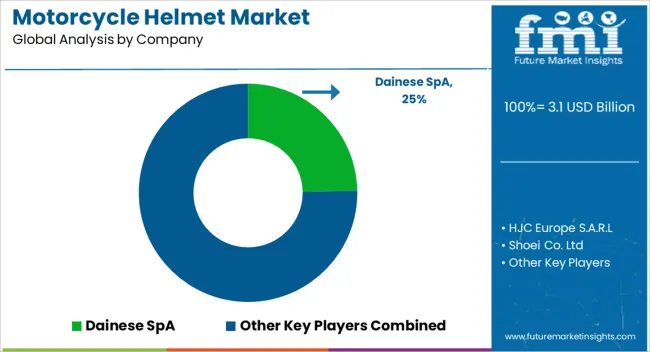
Several companies adopt the strategies of mergers, acquisitions, tie-ups, and partnerships to achieve their common goal. This strategy helps the key players in increasing their market presence and expand their global market. Key players in the Motorcycle helmet market are:
| Report Attributes | Details |
|---|---|
| Current Total Market Size (2025) | USD 3.1 billion |
| Projected Market Size (2035) | USD 6.2 billion |
| CAGR (2025 to 2035) | 7.1% |
| Base Year for Estimation | 2025 |
| Historical Period | 2020 to 2025 |
| Projections Period | 2025 to 2035 |
| Quantitative Units | USD billion for value and million units for volume |
| Product Types Analyzed (Segment 1) | Full Face, Open Face, Off-road Racing, Others |
| Distribution Channels Analyzed (Segment 2) | Online Channels, Offline Channels |
| End Users Analyzed (Segment 3) | Rider, Passenger |
| Regions Covered | North America; Latin America; Western Europe; Eastern Europe; South Asia and Pacific; East Asia; Middle East & Africa |
| Countries Covered | United States, Canada, Mexico, Brazil, Argentina, Germany, France, United Kingdom, Italy, Spain, Netherlands, China, India, Japan, South Korea, ANZ, GCC Countries, South Africa |
| Key Players influencing the Motorcycle Helmet Market | Dainese SpA, HJC Europe S.A.R.L, Shoei Co. Ltd, Arai Helmet Ltd., Alpine Stars S.p.A, Schuberth GmbH, BELL HELMET, FOX, STUDDS Accessories Limited, Royal Enfield, Caberg S.p.a. |
| Additional Attributes | Dollar sales by helmet type (full face, open face, off-road), Rider vs passenger demand trends, Sales channel performance (online vs offline), Technology adoption in helmet design (Bluetooth, ventilation), Premium vs economic helmet segmentation, Regional safety regulation impacts on sales |
| Customization and Pricing | Customization and Pricing Available on Request |
The global motorcycle helmet market is estimated to be valued at USD 3.1 billion in 2025.
The market size for the motorcycle helmet market is projected to reach USD 6.2 billion by 2035.
The motorcycle helmet market is expected to grow at a 7.1% CAGR between 2025 and 2035.
The key product types in motorcycle helmet market are full face, open face, off-road/ racing and others.
In terms of end-user, rider segment to command 62.1% share in the motorcycle helmet market in 2025.






Full Research Suite comprises of:
Market outlook & trends analysis
Interviews & case studies
Strategic recommendations
Vendor profiles & capabilities analysis
5-year forecasts
8 regions and 60+ country-level data splits
Market segment data splits
12 months of continuous data updates
DELIVERED AS:
PDF EXCEL ONLINE
Motorcycle Fuel Hoses Market Size and Share Forecast Outlook 2025 to 2035
Motorcycle Drive Chain Market Size and Share Forecast Outlook 2025 to 2035
Motorcycle Wheels Market Size and Share Forecast Outlook 2025 to 2035
Motorcycle Airbag Jacket Market Size and Share Forecast Outlook 2025 to 2035
Motorcycle Diagnostic Scan Tools Market Size and Share Forecast Outlook 2025 to 2035
Motorcycle Chain Market Analysis - Size, Share, and Forecast 2025 to 2035
Motorcycle Suspension System Market Growth - Trends & Forecast 2025 to 2035
Motorcycle Lead Acid Battery Market - Trends & Forecast 2025 to 2035
Motorcycle Boots Market Analysis - Size, Share, and Forecast 2025 to 2035
Motorcycle Chain Sprocket Market Analysis - Size, Share, and Forecast 2025 to 2035
Market Share Insights for Motorcycle Boots Providers
Motorcycle Horn Market Analysis - Size, Share, and Forecast 2024 to 2034
Motorcycle Headlight Bracket Market Growth – Trends & Forecast 2024-2034
Motorcycle Exhaust Mounting Brackets Market
Motorcycle Side Box Market
Motorcycle Hub Motor Market
Motorcycle Sensors Market
Motorcycle Shock Absorbers Market
Motorcycle Lighting Market
Motorcycle Start Stop Systems Market

Thank you!
You will receive an email from our Business Development Manager. Please be sure to check your SPAM/JUNK folder too.
Chat With
MaRIA